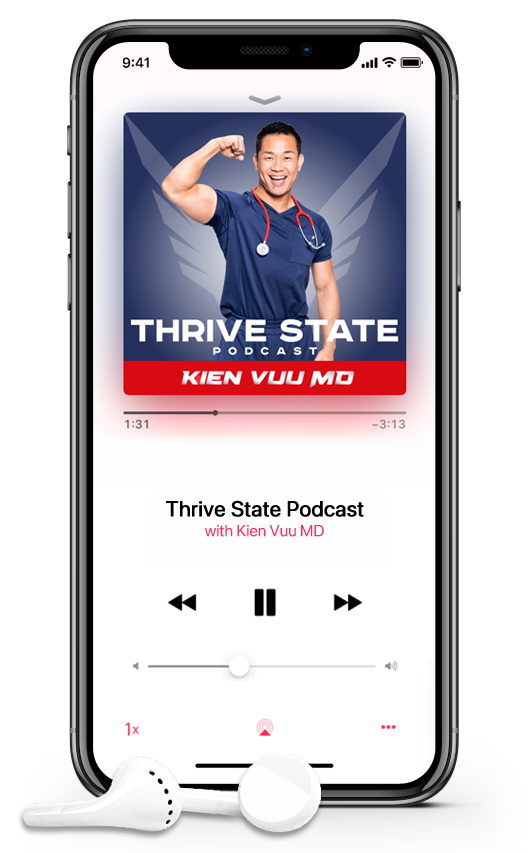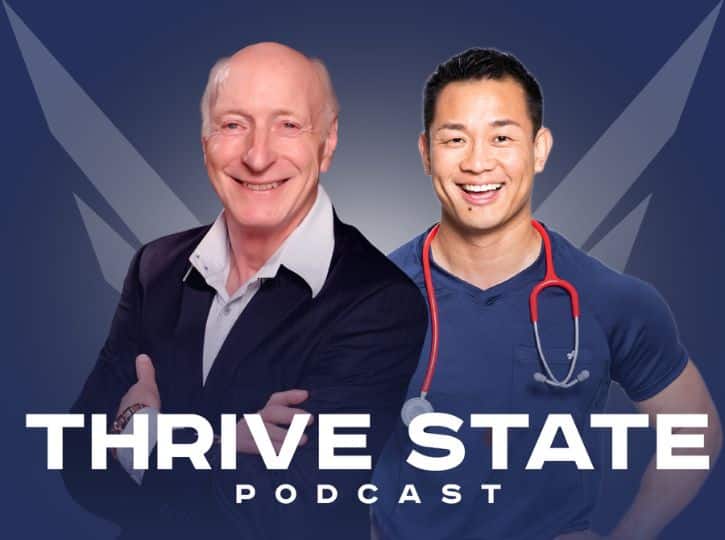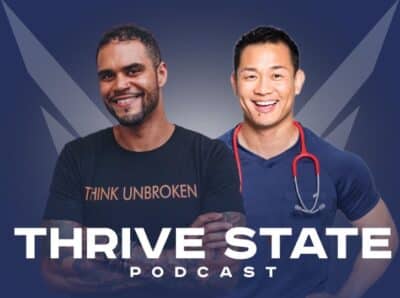Episode 178: Stephen Sideroff
Welcome back to the Thrive State Blog! In this episode of the Thrive State Podcast, Dr. V is joined by Dr. Stephen Sideroff, a clinical psychologist and expert in resilience. Dr. Sideroff’s extensive research and practical insights into resilience offer valuable tools for enhancing longevity and overall well-being.

Understanding Resilience: The Foundation of Well-being
Resilience is the ability to bounce back from adversity, stress, and challenges. Dr. Sideroff explains that resilience is not just about mental toughness but involves a holistic approach that includes physical, emotional, and social well-being. According to a study published in Frontiers in Psychology, resilience is a key predictor of successful aging and longevity.
The Role of Stress in Aging and Longevity
Chronic stress can accelerate aging and increase the risk of various health issues. Dr. Sideroff highlights the importance of managing stress to promote longevity. Techniques such as mindfulness, meditation, and regular physical activity can help mitigate the harmful effects of stress. The American Psychological Association emphasizes that effective stress management is crucial for maintaining mental and physical health.
Practical Strategies for Building Resilience
Dr. Sideroff shares several practical strategies for building resilience:
- Mindfulness and Meditation: Practicing mindfulness helps in staying present and reducing anxiety. Research from Harvard Medical School shows that mindfulness can improve emotional regulation and decrease stress.
- Emotional Regulation: Learning to manage and express emotions healthily is vital for resilience. Techniques such as deep breathing and cognitive restructuring can be effective.
- Physical Activity: Regular exercise boosts mood, reduces stress, and enhances overall health. According to the Mayo Clinic, even moderate physical activity can significantly improve resilience.
- Social Support: Building strong social connections provides emotional support and fosters resilience. A study in the Journal of Health Psychology found that social support is a critical factor in coping with stress and adversity.
Overcoming Common Barriers to Resilience
Dr. Sideroff discusses common barriers to resilience, such as negative thinking patterns, lack of self-compassion, and poor lifestyle choices. He offers actionable advice on how to overcome these barriers and develop a resilient mindset.
Real-Life Examples of Resilience in Action
Throughout the episode, Dr. Sideroff shares inspiring real-life examples of individuals who have successfully built resilience and transformed their lives. These stories illustrate the power of resilience and its impact on health and longevity.
Takeaways and Usable Information
- Practice Mindfulness: Incorporate mindfulness and meditation into your daily routine to manage stress.
- Build Social Connections: Strengthen your support network to enhance resilience.
- Engage in Regular Exercise: Physical activity is essential for both mental and physical resilience.
- Develop Emotional Regulation Skills: Learn techniques to manage and express emotions healthily.
- Follow Doctor V @doctorvmd
- Buy the 2nd edition of Thrive State at thrivestatebook.com
- Download a free resource guide at thrivestatestarter.com
Relevant Links:
- How to Keep Your Head On Straight in 2021
- Talking Sh*T !!! How Your Gut Affects Your Health and Performance
- Listening to Your Inner Truth
- Ultimate Performance Tools of the Titans
- Hacking Your Movement and Breath for Peak Performance
- Making of a SuperHero body with Celebrity Nutrition Expert with Rehan Jalali
- World Building
- The Healing Power of Decision
- Courageous Love - Overcoming Assault, Addiction, and Divorce
- The Easy Way or The Heart Way - Master Your Cardiovascular Health
- The Medicine of Authenticity and Intuition
- The Healing Power of Being in the NOW
- Living with No Regrets After "She Bangs"
- Say Yes to NO - Nitric Oxide as the magic molecule to Erections and Vascular Health
- Former Miss California Reveals Health Insights from the World of Pageants
- Finding Your Community Through Purpose
- The Synergistic Healing Energies of Culinary Alchemy
- Leading Yourself to Success While Having Fun
- Love is the Strongest Medicine
- Get Healthy AF with a Habits-Based Approach
- Light Em Up - The Performance Benefits of Red Light Therapy
- A Game Changing Approach to Peak Performance
- Transform Yourself and Your Love Life with Integrity Dating
- What the F*&$ is Performance Medicine???
- How to BioHack and Manifest Your Best Life
- Epigenetics - How to Control Your Genetic Destiny
- Mindset and Moonshots
- Sexual Biohacking: Secrets Revealed to Getting Turned On
- Sugarproof: How to Protect You and Your Children against Disease
- Healing DIS-ease with Qigong
- Live to 200: The Science and Technology of Growing Young
- Powerful Mental and Emotional Hacks to Health and Success
- Stop Emotional Eating NOW - Secrets to Never Having to Diet Again
- How to Activate Your Thrive State
- Overcoming Dyslexia and Turning Ferrari Clients into F1 High Performers
- The Vision and Mindset of Achieving Anything You Want
Other YouTube videos to enjoy:
- How to Cook Rice | White Rice vs. Brown Rice | Is Rice Healthy? | Red Rice, Black Rice, Purple Rice
- Sugar is more addictive than Cocaine!? | Why sugar is bad for you | How to quit sugar
- How Stress Affects Your Mind and Body | Chronic Disease | Stress Relief | Doses of Fun
- Morning Routines | Successful morning habits | My Best Healthy Morning Routine
- Are You Really Happy? How to be happier? | The secret to Happiness
- Men Lifestyle & Health Tips | 11 Ways to Stay Sexy | Kevin Kreider | KienVuuMD
- FINDING YOUR PURPOSE | Motivational Video | Daily #motivation #Inspirations #Passion
- MOTIVATIONAL | INSPIRATIONAL VIDEO | Health is a CHOICE | The POWER of CHOICE
- Viome - Naveen Jain | How poop can affect your health!
- Philly Cheese Steak! Why it should be a Recreational Indulgence | Diet Choices








